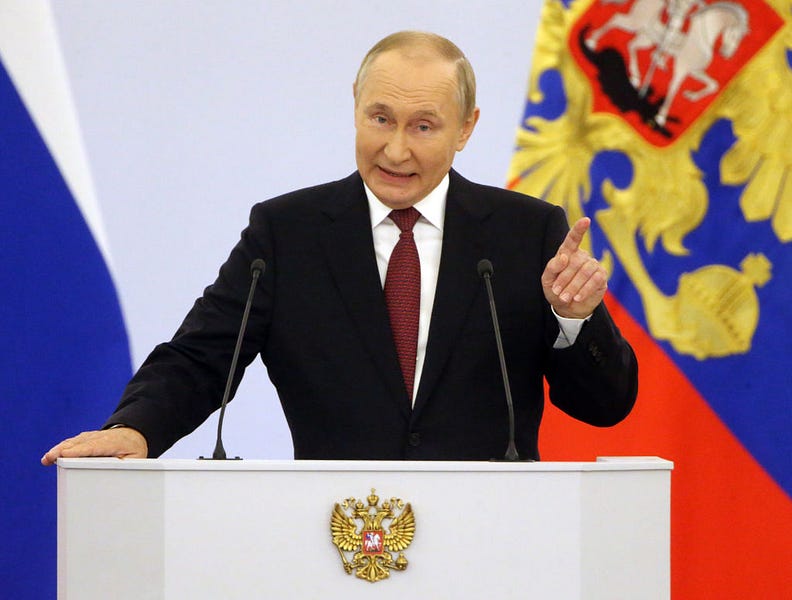It’s an article of various faiths—both secular and religious—that misunderstanding is the cause of conflict.
This sort of insight is generally true for individuals, so it’s often considered equally true of nations. Hence vast amounts of anti-war activism and state-level diplomacy rest on the assumption that nations are like people and if we can just get adversaries to talk to each other, and thereby to understand each other’s perspective, the bloodshed will end or be avoided in the first place.
The only problem: It’s not true.
Consider the Russian invasion of Ukraine. According to Vladimir Putin, Ukrainians are Russians. He’s long insisted that they are “one people.” In 2021 he issued a 5,000 word manifesto on this theme. I have only revulsion for Putin’s criminal invasion of Ukraine, but Ukraine and Russia do have a deeply intertwined past. That connection doesn’t justify Putin’s attempted annexation of Ukraine any more than it would justify Ukraine in attempting to annex Russia. But it does illuminate how mutual understanding isn’t a safeguard against war.
Pakistanis and Indians, Israelis and Palestinians, Irish Catholics and Protestants, Serbs and Croats, Hutus and Tutsis, and nearly every other warring group you can think of do not lack for understanding of each other.
Sigmund Freud coined the term “narcissism of small differences” to describe the phenomenon. “It is precisely the minor differences in people who are otherwise alike that form the basis of feelings of hostility between them.”
In his book, Bloodlust, Russell Jacoby recounts how civil wars are usually crueler and bloodier than wars between “external” enemies. In the American Civil War, North and South understood each other very well. Brothers, both literally and figuratively, fought each other. Mutual understanding fueled anger rather than dampen it because mutual understanding illuminates the sense of betrayal, even heresy.
Understanding the limits of understanding is essential because if you believe talking is the only solution to conflict (and not merely the most preferable one), your opponent will use talk solely to distract or delay.
More importantly, this view often fosters sympathy or even support for bad actors on the assumption that they’ve been unfairly misunderstood—and that America is to blame for foolishly “provoking” them.
It’s amazing how some people feel that merely describing our adversaries motives is a justification for their actions. By confusing explanations for excuses—Putin feels surrounded! Iran wants a nuke to protect its regime!—this perspective often puts all of the blame for tensions or conflict on America or the West.
I’ve made this point many times before, usually as a critique of left-leaning opponents of American foreign policy who insisted that all tensions stemmed from our misunderstanding of our adversaries.
There’s still a lot of that on the left, but it’s now a much more bipartisan affair, with many on the right insisting that we are being “provocative” by aiding Ukraine.
To listen to some critics of American support for Ukraine, Putin is less a human being with the ability to make decisions and more like a force of nature or a wild animal. Like a grizzly bear that—understandably!—mauls someone who teases it, Putin is just doing what he must, like some Aesopian creature.
The right’s newfound fondness for Putin and its (in Jeanne Kirkpatrick’s memorable phrase) “blame America first” mindset (much like the old Cold War left-wing versions) has much to do with ideological commitments that only tangentially have to do with foreign policy.
For many on the nationalist right, Putin plays the same role Fidel Castro did for the socialist left—an avatar for a wholesale critique of America. They like him because Putin is “strong,” anti-gay, anti-woke, and a Christian nationalist.
The hitch to all of this is that their understanding of Putin is little more than a fantasy. The mastery and competence his fans once celebrated is now a joke. Up to 60,000 Russians have died in Ukraine since February—roughly four times the number of casualties in the decade-long Soviet invasion of Afghanistan—and more Russians have tried to flee the country to avoid fighting in this criminally stupid war than have been deployed to Ukraine.
Obviously, we have to take nuclear threats from a sociopath seriously. But Putin is counting on his belief that America and the West are weak and decadent to save him from a disaster of his own making. The last thing we should do is act like he understands us better than we understand ourselves.







Please note that we at The Dispatch hold ourselves, our work, and our commenters to a higher standard than other places on the internet. We welcome comments that foster genuine debate or discussion—including comments critical of us or our work—but responses that include ad hominem attacks on fellow Dispatch members or are intended to stoke fear and anger may be moderated.
With your membership, you only have the ability to comment on The Morning Dispatch articles. Consider upgrading to join the conversation everywhere.